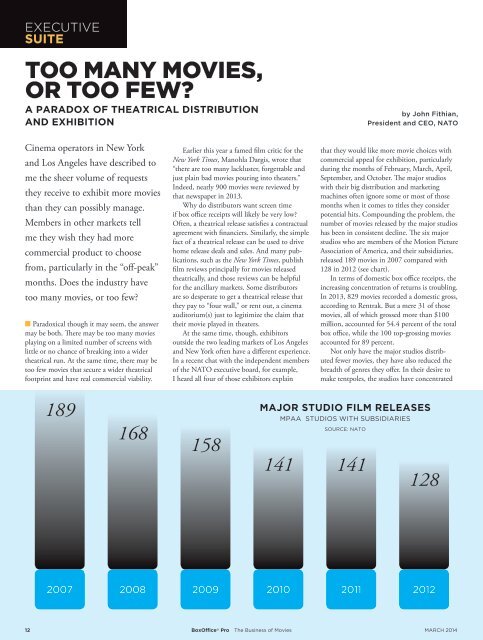Create successful ePaper yourself
Turn your PDF publications into a flip-book with our unique Google optimized e-Paper software.
EXECUTIVE<br />
SUITE<br />
TOO MANY MOVIES,<br />
OR TOO FEW?<br />
A PARADOX OF THEATRICAL DISTRIBUTION<br />
AND EXHIBITION<br />
by John Fithian,<br />
President and CEO, NATO<br />
Cinema operators in New York<br />
and Los Angeles have described to<br />
me the sheer volume of requests<br />
they receive to exhibit more movies<br />
than they can possibly manage.<br />
Members in other markets tell<br />
me they wish they had more<br />
commercial product to choose<br />
from, particularly in the “off-peak”<br />
months. Does the industry have<br />
too many movies, or too few?<br />
n Paradoxical though it may seem, the answer<br />
may be both. There may be too many movies<br />
playing on a limited number of screens with<br />
little or no chance of breaking into a wider<br />
theatrical run. At the same time, there may be<br />
too few movies that secure a wider theatrical<br />
footprint and have real commercial viability.<br />
Earlier this year a famed film critic for the<br />
New York Times, Manohla Dargis, wrote that<br />
“there are too many lackluster, forgettable and<br />
just plain bad movies pouring into theaters.”<br />
Indeed, nearly 900 movies were reviewed by<br />
that newspaper in 2013.<br />
Why do distributors want screen time<br />
if box office receipts will likely be very low?<br />
Often, a theatrical release satisfies a contractual<br />
agreement with financiers. Similarly, the simple<br />
fact of a theatrical release can be used to drive<br />
home release deals and sales. And many publications,<br />
such as the New York Times, publish<br />
film reviews principally for movies released<br />
theatrically, and those reviews can be helpful<br />
for the ancillary markets. Some distributors<br />
are so desperate to get a theatrical release that<br />
they pay to “four wall,” or rent out, a cinema<br />
auditorium(s) just to legitimize the claim that<br />
their movie played in theaters.<br />
At the same time, though, exhibitors<br />
outside the two leading markets of Los Angeles<br />
and New York often have a different experience.<br />
In a recent chat with the independent members<br />
of the NATO executive board, for example,<br />
I heard all four of those exhibitors explain<br />
that they would like more movie choices with<br />
commercial appeal for exhibition, particularly<br />
during the months of February, <strong>March</strong>, April,<br />
September, and October. The major studios<br />
with their big distribution and marketing<br />
machines often ignore some or most of those<br />
months when it comes to titles they consider<br />
potential hits. Compounding the problem, the<br />
number of movies released by the major studios<br />
has been in consistent decline. The six major<br />
studios who are members of the Motion Picture<br />
Association of America, and their subsidiaries,<br />
released 189 movies in 2007 compared with<br />
128 in 2012 (see chart).<br />
In terms of domestic box office receipts, the<br />
increasing concentration of returns is troubling.<br />
In 2013, 829 movies recorded a domestic gross,<br />
according to Rentrak. But a mere 31 of those<br />
movies, all of which grossed more than $100<br />
million, accounted for 54.4 percent of the total<br />
box office, while the 100 top-grossing movies<br />
accounted for 89 percent.<br />
Not only have the major studios distributed<br />
fewer movies, they have also reduced the<br />
breadth of genres they offer. In their desire to<br />
make tentpoles, the studios have concentrated<br />
189<br />
168<br />
158<br />
MAJOR STUDIO FILM RELEASES<br />
MPAA STUDIOS WITH SUBSIDIARIES<br />
SOURCE: NATO<br />
141 141<br />
128<br />
2007 2008 2009 2010 2011 2012<br />
12 BoxOffice ® <strong>Pro</strong> The Business of Movies MARCH <strong>2014</strong>

















